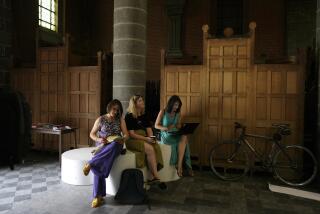Ethnic Groups Lose Ties to the Past as Their Churches Close
- Share via
FORD CITY, Pa. — There were a host of reasons for closing Holy Trinity--a shrinking community, a shortage of priests, the finances--but what Rose Bloser knows is that a big chunk of her past was lost when the predominantly Slovak church shut its doors.
She was baptized there, and later walked down its aisle to be married. She made a life in that church.
“When everything boils down, all you have left is your roots,” said Bloser, 51, whose Roman Catholic church closed several Sundays ago. “I realize we’re all in a melting pot, but you always keep some ties to where you came from.”
In the 1800s and 1900s, Eastern European immigrants flooded into southwestern Pennsylvania to work in the coal mines and steel mills. Neighborhoods in and around Pittsburgh swelled with their numbers.
The immigrants brought with them their work ethic, languages and religions. Churches--many of them Catholic--sprang up, statues of patron saints watched over them in the New World, Masses were held in their native tongues.
Now, in Pittsburgh and across the nation, many of those ethnic churches are gone, and parishioners worry that their cultural past could be lost.
On the same day Holy Trinity shut its doors in Ford City, 35 miles northeast of Pittsburgh, two other ethnic parishes did the same: St. Francis of Paola, a predominantly Polish church, and St. Mary’s, attended by German families. Church officials said there were too few people to support keeping all three.
It was the same story a month earlier in McKeesport, where St. Stephen’s closed after ministering to Hungarian immigrants for more than a century. It had gone as far in its early history as to import a priest from Hungary to serve Mass; there were 13 oaken statues inside the church, each representing an aspect of Hungarian history and religion.
“I was baptized there, made my first Communion there and was confirmed there,” Zoltan Toth recalled. “We are like a family because we all grew up there.”
Elsewhere St. Jehoshaphat’s, a Polish parish in Cleveland, closed two years ago. In March, a Roman Catholic church in Gary, Ind., that once drew nearly 1,000 Polish, Czech and Lithuanian parishioners closed after attendance dwindled to about 200.
From 1988 to 1995, Pittsburgh’s Roman Catholic diocese closed 19 ethnic parishes; at the same time, 19 territorial parishes--those serving people within established boundaries--closed because of costs and a declining number of congregants.
Priests said steel mills, coal mines and other businesses were hit hard in the 1980s, and people left the older ethnic centers to find work elsewhere.
For many others, the immigrant churches carried a connection to the past that they thought they no longer needed.
“That ethnic heritage is not as important to the younger generation,” said Father John Rushofsky, who has worked at several defunct parishes serving various ethnic groups in the Pittsburgh diocese. He said the loss of those churches left many older members resentful.
“It’s painful for them because I think what it means to them is that a lot of their ethnic heritage seems to be being disregarded,” he said.
In Pittsburgh’s Polish Hill neighborhood, Immaculate Heart of Mary still holds Mass in Polish at 8 a.m. every Sunday.
But the church school, where Polish was taught, has been closed for years.
And the Mass attracts only about 50 people in a church that could easily hold many times that number.
Most of the people who attend are middle-aged or older.
Olaf Saykiewicz, a 30-year-old Polish immigrant, goes to Immaculate Heart of Mary to keep his traditions alive.
“We’re becoming more integrated, which is good, but at the same time, we’re losing our identity,” he said.
More to Read
Sign up for Essential California
The most important California stories and recommendations in your inbox every morning.
You may occasionally receive promotional content from the Los Angeles Times.













